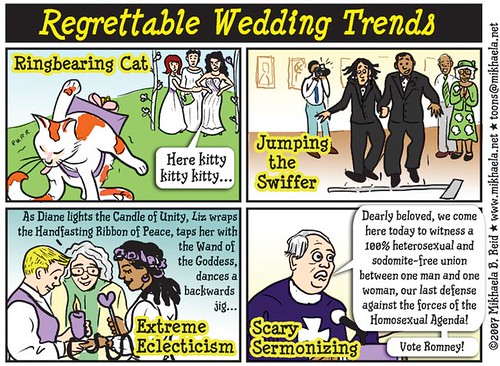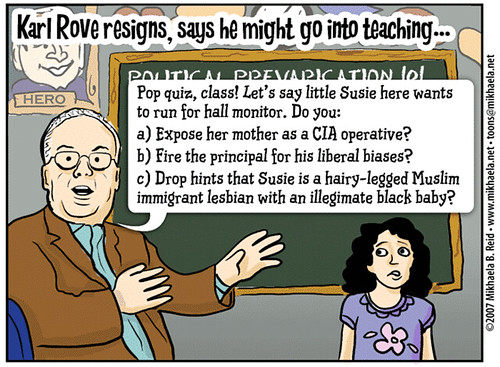Every holiday season, there are calendars to be sold as presents full of the asinine things our president has said. We think they’re funny, doubt he said some things, and roll our eyes at others. Some of us have read quotes that infuriated us. But Bush’s remarks on Wednesday comparing Vietnam to Iraq topped them all in absurdity.
To begin, the brains behind this pathetic PR tactic: "Freedom’s Watch, a conservative group, plans to launch a $15 million advertising campaign in 20 states today. The group’s spokesman, former Bush press secretary Ari Fleischer, says the goal is to tell people that the buildup of U.S. troops in Iraq is working" (USA Today). Now check out the Salon article about Fleischer and Freedom’s Watch: …"the manipulative style of the Freedom’s Watch ads — and the apparent decision to air them against wavering Republicans — signals desperation, not strength." The perfect description of Bush talking about Vietnam as if he’s turned his head to history, blocked his ears, and chanted, "I’m not listening, la la la la."
The highlights:
"Bush said that like World War II, the Korean War, and the Vietnam War, the war in Iraq was an ‘ideological struggle’ as he again depicted the conflict as part of the broader U.S. ‘war on terror.’" (Yahoo News)
"In a speech to army veterans in Kansas City, Mr. Bush invoked one of America’s biggest military disasters in suppport of keeping troops in Iraq…He said that there had been lots of critics of U.S. involvement in Vietnam at the time — mentioning, among others, Graham Greene and a Washington Post columnist — and implying that, with the benefit of hindsight, they were wrong, just as critics of the Iraq war will later be seen to be misguided." (The Guardian UK)
"Three decades later, there is a legitimate debate about how we got into the Vietnam War and how we left…Whatever your position is on that debate, one unmistakable legacy of Vietnam is that the price of America’s withdrawal was paid by millions of innocent citizens whose agonies would add to our vocabulary new terms, like ‘boat people,’ ‘reeducation camps,’ and ‘killing fields.’" (Yahoo News)
Ironic how the war in Iraq has left us with a vocabulary that includes Abu Ghraib and Haditha. Now here is what the many prestigious historians and experts had to say:
"Vietnam historian Stanley Karnow said Bush is reaching for historical analogies that don’t track. He said, ‘Vietnam was not a bunch of sectarian groups fighting each other,’ as in Iraq. In Cambodia, the Khmer Rouge toppled a U.S.-backed government." (USA Today)
"Robert Dallek, author of several celebrated biographies of recent U.S. presidents, including Lyndon Johnson, told the Los Angeles Times: ‘It just boggles my mind, the distortions I feel are perpetrated here by the president.’
‘We were in Vietnam for 10 years. We dropped more bombs on Vietnam than we did in all of World War II in every theater. We lost 58,700 American lives, the second-greatest loss of lives in a foreign conflict. And we couldn’t work our will,’ he said.
‘What is Bush suggesting? That we didn’t fight hard enough, stay long enough? That’s nonsense. It’s a distortion,’ he continued. ‘We’ve been in Iraq longer than we fought in World War II. It’s a disaster, and this is a political attempt to lay the blame for the disaster on his opponents. But the disaster is the consequence of going in, not getting out.’
The New York Times also talked to Dallek, who pointed out that the slaughters of the Khmer Rouge in Cambodia ‘was a consequence of our having gone into Cambodia and destabilized that country.’
…The Washington Post quoted Steven Smith, senior fellow at the Council on Foreign Relations: ‘The president emphasized the violence in the wake of American withdrawal from Vietnam. But this happened because the United States left too late, not too early. It was the expansion of the war that opened the door to Pol Pot and the genocide of the Khmer Rouge. The longer you stay the worse it gets.’" (Editor & Publisher)
"’It is undoubtedly true that America’s failure in Vietnam led to catastrophic consequences in the region, especially in Cambodia,’ said David Hendrickson, a specialist on the history of American foreign policy at Colorado College. ‘But there are a couple of further points that need weighing,’ he added. ‘One is that the Khmer Rouge would never have come to power in the absence of the war in Vietnam — this dark force arose out of the circumstances of the war, was in a deep sense created by the war. The same thing has happened in the Middle East today. Foreign occupation of Iraq has created far more terrorists than it has deterred.’" (International Herald Tribune)
"Historians have cited the U.S. intervention and bombing campaign (spanning 1965-1973) as a significant factor leading to increased support of the Khmer Rouge among the Cambodian peasantry. Historian Ben Kiernan and Taylor Owen have used a combination of sophisticated satellite mapping, recently unclassified data about the extent of bombing activities, and peasant testimony to argue that there was a strong correlation between villages targeted by U.S. bombing and recruitment of peasants by the Khmer Rouge. Kiernan and Owen argue that ‘Civilian casualties in Cambodia drove an enraged populace into the arms of an insurgency that had enjoyed relatively little support until the bombing began.’ In his study of Pol Pot’s rise to power, Kiernan argues that ‘Pol Pot’s revolution would not have won power without U.S. economic and military destabilisation of Cambodia’ and that the U.S. carpet bombing ‘was probably the most significant factor in Pol Pot’s rise.’" (Wikipedia entry for Khmer Rouge)
In an article in the Walrus Magazine, Kiernan and Taylor Owen wrote that recent evidence reveals that Cambodia was bombed by the U.S. far more heavily than previously believed. They conclude that ‘the impact of this bombing, the subject of much debate for the past three decades, is now clearer than ever. Civilian casualties in Cambodia drove an enraged populace into the arms of an insurgency that had enjoyed relatively little support until the bombing began, setting in motion the expansion of the Vietnam War deeper into Cambodia, a coup d’état in 1970, the rapid rise of the Khmer Rouge, and ultimately the Cambodian genocide.’" (Wikpedia entry for Ben Kiernan)
Bush, Sr. in 1991 on invading Iraq: "Trying to eliminate Saddam…would have incurred incalculable human and political costs. Apprehending him was probably impossible…We would have been forced to occupy Baghdad and, in effect, rule Iraq…there was no viable ‘exit strategy’ we could see, violating another of our principles. Furthermore, we had been self-consciously trying to set a pattern for handling aggression in the post-Cold War world. Going in and occupying Iraq, thus unilaterally exceeding the United Nations’ mandate, would have destroyed the precedent of international response to aggression that had hoped to establish. Had we gone the invasion route, the United States could conceivably still be an occupying power in a bitterly hostile land." (Originally from the memoir, A World Transformed, by George H. W. Bush and Brent Scowcroft. Quoted in What We’ve Lost by Graydon Carter)
And finally, in a video that surfaced this week on YouTube, Dick Cheney echoes the previous remarks exactly. He even uses the word "quagmire."
Usually our president’s silly remarks are spontaneous, unplanned. But this was a prepared speech. There had to be speech writers involved, drafts, and revisions. Wasn’t there anyone along the way, however lowly the positions, who read it and said, "Um, hold the phone"? Or have they all lost their minds along with their credibility?
Jennifer Leblanc
Dear Reader,
In The Fray is a nonprofit staffed by volunteers. If you liked this piece, could you
please donate $10? If you want to help, you can also:




